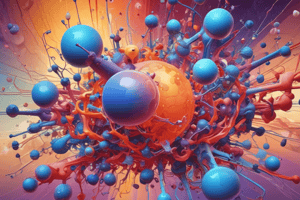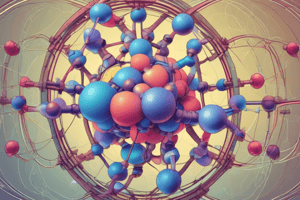Podcast
Questions and Answers
Which of the following is NOT a physical property of matter?
Which of the following is NOT a physical property of matter?
- Density
- Melting point
- Color
- Flammability (correct)
Which of the following is an example of a heterogeneous mixture?
Which of the following is an example of a heterogeneous mixture?
- Air
- Sand and water (correct)
- Salt water
- Sugar dissolved in water
What is the key characteristic that distinguishes a compound from a mixture?
What is the key characteristic that distinguishes a compound from a mixture?
- Compounds have a fixed composition, while mixtures can vary. (correct)
- Compounds are always solids, while mixtures can be any state of matter.
- Compounds can be separated by physical means, while mixtures cannot.
- Compounds are made of two or more elements, while mixtures are not.
Which of the following is an example of an extensive property?
Which of the following is an example of an extensive property?
Which of the following is NOT a sign of a chemical change?
Which of the following is NOT a sign of a chemical change?
What is the state of matter that exists at extremely low temperatures and high densities, where atoms act as one?
What is the state of matter that exists at extremely low temperatures and high densities, where atoms act as one?
Which law states that mass cannot be created or destroyed during a chemical reaction?
Which law states that mass cannot be created or destroyed during a chemical reaction?
Which of the following is a method used to separate mixtures based on differences in boiling points?
Which of the following is a method used to separate mixtures based on differences in boiling points?
Which of the following is a characteristic of a solid?
Which of the following is a characteristic of a solid?
Which of the following is an example of a chemical property?
Which of the following is an example of a chemical property?
Flashcards
Definition of Chemistry
Definition of Chemistry
The study of matter, its properties, and changes.
States of Matter
States of Matter
Forms in which matter exists: Solid, Liquid, Gas, Plasma.
Solid
Solid
Matter with a definite shape and volume; particles are tightly packed.
Liquid
Liquid
Signup and view all the flashcards
Gas
Gas
Signup and view all the flashcards
Physical Property
Physical Property
Signup and view all the flashcards
Chemical Property
Chemical Property
Signup and view all the flashcards
Homogeneous Mixtures
Homogeneous Mixtures
Signup and view all the flashcards
Law of Conservation of Mass
Law of Conservation of Mass
Signup and view all the flashcards
Extensive vs. Intensive Properties
Extensive vs. Intensive Properties
Signup and view all the flashcards
Study Notes
Chemistry
- Chemistry is the study of matter, its composition, properties, structure, and all changes it undergoes.
- Matter is anything that occupies space and has mass.
States of Matter
- Solid:
- Definite shape (rigid)
- Definite volume
- Liquid:
- No definite shape (takes the shape of its container)
- Definite volume
- Particles are free to move over each other, but still attracted to each other
- Gas:
- No definite shape (takes the shape of its container)
- No definite volume
- Particles move in random motion with little or no attraction to each other
- Plasma:
- Extremely hot charged particles in gaseous state
- Temperatures range from 11,000°F (6,093°C) to 14,500°F (8,038°C)
- Examples include lightning, auroras, and plasma balls (Lightning's temperature is 20,000°C).
- Bose-Einstein Condensate: extremely cool and condensed atoms acting as one (awarded 2001 Nobel Prize in Physics).
- Rubidium atoms at 0 K (-273.15 °C)
Properties of Matter
- Physical Property: A property that can be observed or measured without changing the substance's identity or composition. Examples include color, odor, taste, physical state, boiling point, melting point, conductivity, and hardness.
- Chemical Property: A property that describes a substance's behavior in a chemical reaction. Examples include flammability, reactivity, ability to oxidize.
- Extensive Property: An observable property that changes with the amount of substance (e.g., weight, inertia, volume).
- Intensive Property: A property that does not change with the amount of substance (e.g., temperature, density, boiling point).
Laws Governing Changes in Matter
- Law of Conservation of Mass: Mass is neither created nor destroyed in physical or chemical changes.
- Law of Conservation of Energy: Energy is not created or destroyed, only changed from one form to another.
- Law of Definite Proportions (Law of Constant Composition): A given compound always contains exactly the same proportion of elements by mass.
- Law of Multiple Proportions: When two elements form a series of compounds, the ratios of the masses of the second element that combine with 1 gram of the first element can be reduced to small whole numbers.
Classification of Matter
-
Mixture: A substance with variable composition made of two or more substances that do not chemically combine.
- Homogeneous Mixture: Constant composition throughout (solution).
- Heterogeneous Mixture: Variable composition, different components visible (suspension, colloid).
- Suspension: Particles settle out;
- Colloid: Intermediate particle size between solution and suspension.
-
Pure Substance: Constant composition, either an element or a compound.
- Element: Cannot be broken down into simpler substances by chemical means.
- Compound: Two or more elements chemically combined in a fixed ratio.
Ways of Separating Mixtures
- Handpicking/ Mechanical Separation: Separating substances by hand.
- Distillation: Separation process by converting liquid to vapor and then back to liquid.
Studying That Suits You
Use AI to generate personalized quizzes and flashcards to suit your learning preferences.




